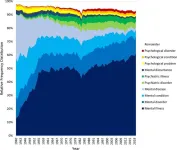(Press-News.org) Researchers from Indian Institute of Management Calcutta, University of Chicago, and Management Development Institute, Gurgaon published a new Journal of Marketing study that examines the unintended consequences of an Indian government healthcare policy.
The study, forthcoming in the Journal of Marketing, is titled “Do No Harm? Unintended Consequences of Pharmaceutical Price Regulation in India” and is authored by Saravana Jaikumar, Pradeep K. Chintagunta, and Arvind Sahay.
In countries without universal health insurance or developed health care systems, governments try to make drugs affordable and accessible. For instance, in India, where around 80% of healthcare expenses are borne privately with the majority paid out-of-pocket, the ostensible reason for price regulation is to increase the affordability of essential drugs. However, there is a general lack of empirical evidence assessing the impact of regulation on the availability, accessibility, and sales of prescription drugs in emerging economies, such as India.
This new Journal of Marketing study examines the unintended consequences of India’s Drug Price Control Order in 2013 (DPCO 2013) that was instituted to make essential medicines more affordable. Because of the lower prices intended to increase drug accessibility, the researchers find that pharmaceutical firms curtailed marketing efforts for regulated drugs due to diminished profit margins and shifted their focus to unregulated (but related) drugs. This shift disproportionately affected prescriptions issued by less formally educated physicians—those who often serve the most economically disadvantaged populations, and the very groups DPCO 2013 aimed to benefit.
The process began in September 2011 when the Indian government prepared a National List of Essential Medicines (NLEM). In May 2013, the government announced price regulations for these drugs, capping their prices. Brands priced above the cap were required to reduce their prices to at or below the price cap, while brands already priced below the cap were required to retain current prices.
The government implemented several measures to mitigate potential negative reactions from firms. The order required firms to maintain current production volumes of regulated drugs. While firms may apply to exit a category with a six-month notice, the order reserved the right to mandate production for up to 12 months. Furthermore, price increases for regulated drugs were limited to inflation levels. Additionally, it capped annual price hikes for unregulated drugs at 10% to prevent firms from offsetting lost margins on regulated drugs by raising prices on unregulated ones.
The Marketing Curveball
The researchers look at 179 oral solid drugs (pills) included in DPCO 2013. By comparing data from India to the Philippines—a country without similar regulations—and find that, on average, the sales volumes of these regulated drugs declined in India.
The strategic shift in marketing efforts of firms is identified as a main contributing factor. In India, where direct-to-consumer advertising is prohibited for prescription drugs, the main vehicle for promotion is detailing; that is, providing information about drugs and their efficacy to physicians, usually by medical representatives from pharmaceutical firms. Jaikumar says that “using detailing data from a large pharmaceutical firm, we find that due to the lowered margins of regulated drugs, firms shifted their detailing focus to unregulated but related drugs. For example, a firm could have shifted its marketing focus from atorvastatin, which is a regulated drug for cholesterol issues, to rosuvastatin, an unregulated drug prescribed for similar issues.”
The study further examines this shift’s impact on prescriptions from physicians without formal medical degrees (termed as non-MBBS Physicians). Large parts of India lack access to highly qualified doctors, and physicians without formal medical degrees usually provide healthcare and actively prescribe allopathic medicines. “Due to the shift in detailing focus, the percentage of prescriptions for regulated drugs from these non-MBBS physicians declined. Further, our surveys show that compared to formally trained medical professionals, non-MBBS physicians relied heavily on pharmaceutical detailing to inform their prescribing practices,” explains Chintagunta.
The research rules out other potential explanations for the declining sales volumes of regulated drugs. The prevalence of diseases like acute respiratory infections, circulatory system diseases, diabetes, HIV/AIDS, malaria, and pneumonia has increased, which does not explain the sales decline. Also, new drug approvals have dropped significantly since 2013 and AYUSH (traditional Indian medicine) has also declined. “Our findings strongly support a detailing-led explanation for the reduced sales volumes,” says Sahay.
Lessons for Regulators, Marketing Officers, and Advocacy Groups
This study serves as a reminder of the interconnectedness of policies and market dynamics.
Regulators must understand the full spectrum of a policy’s impact before implementing it. This includes considering how pharmaceutical firms might react to price caps, including marketing strategies, and the downstream effects on healthcare providers and patients.
Pharmaceutical companies need to maintain a balance between profitability and social responsibility, particularly in markets heavily reliant on out-of-pocket spending for healthcare.
Patient advocacy groups must amplify their role in policy discussions, ensuring that the voices of the most vulnerable populations are heard and that their needs are prioritized in healthcare regulations.
This web companion extends this research by providing detailed context and results for broader dissemination.
Full article and author contact information available at: https://doi.org/10.1177/00222429241242685
About the Journal of Marketing
The Journal of Marketing develops and disseminates knowledge about real-world marketing questions useful to scholars, educators, managers, policy makers, consumers, and other societal stakeholders around the world. Published by the American Marketing Association since its founding in 1936, JM has played a significant role in shaping the content and boundaries of the marketing discipline. Shrihari (Hari) Sridhar (Joe Foster ’56 Chair in Business Leadership, Professor of Marketing at Mays Business School, Texas A&M University) serves as the current Editor in Chief.
https://www.ama.org/jm
About the American Marketing Association (AMA)
As the largest chapter-based marketing association in the world, the AMA is trusted by marketing and sales professionals to help them discover what is coming next in the industry. The AMA has a community of local chapters in more than 70 cities and 350 college campuses throughout North America. The AMA is home to award-winning content, PCM® professional certification, premiere academic journals, and industry-leading training events and conferences.
https://www.ama.org
END
How an Indian government policy backfired: the unintended consequences of price regulation of prescription drugs
News from the Journal of Marketing
2024-06-04
ELSE PRESS RELEASES FROM THIS DATE:
Exercising during pregnancy normalizes eating behaviors in offspring from obese mice
2024-06-04
Maternal obesity impacts the eating behaviors of offspring via long-term overexpression of the microRNA miR-505-5p, according to a study publishing June 4th in the open-access journal PLOS Biology by Laura Dearden and Susan Ozanne from the MRC Metabolic Diseases Unit, Institute of Metabolic Science, University of Cambridge, UK, and colleagues.
Previous studies in both humans and animal models have shown that the offspring of obese mothers have a higher risk of obesity and type 2 diabetes. While this relationship is likely the result of a complex relationship between genetics and environment, emerging ...
Managing mental health should be about more than mind
2024-06-04
Clinicians often default to treating mental health conditions with a variety of medication. This approach, however, largely ignores the role of environment, lifestyle, and social factors. Mental Health professionals must work toward a more holistic management picture, Sidarta Ribeiro, Ana Paula Pimentel, Paulo Amarante and colleagues at the Federal University of Rio Grande do Norte, Federal University of Rio de Janeiro and FIOCRUZ in Brazil argue in the new open-access journal PLOS Mental Health on June 4.
More people than ever are being diagnosed with mental health conditions—particularly children and young adults. The World Health Organization estimates that mental health ...
Signaling between brain regions altered in teenage internet addiction
2024-06-04
Max Chang and Irene Lee of University College London review neuroimaging studies of the effects of internet addiction on adolescent brains. Published June 4 in PLOS Mental Health, the study indicates that internet addiction is associated with disrupted signaling in the regions of the brain that are involved in multiple neural networks. These networks play an important role in controlling our attention, in association with intellectual ability, working memory, physical coordination, and emotional processing—all of which ...
In “mental illness” and “mental health”: how language around psychiatric conditions shifts
2024-06-04
A new survey of nearly 340,000 texts spanning 79 years shows that generic terms in mental health have shifted away from words like “disease” and “disturbance” and toward “psychiatric” and “mental health,” with “mental illness” becoming the most-used term. Nick Haslam and Naomi Baes at the University of Melbourne in Australia present these findings in the new open-access journal PLOS Mental Health on June 4.
The authors state that while words such as “crazy” and “lunatic” ...
Methods to quit smoking effective regardless of mental health history
2024-06-04
Sarah Jackson and colleagues from University College London and King’s College London branches of the SPECTRUM Consortium conducted a survey to study how mental health relates to methods people use to quit smoking, also known as smoking cessation aids. While the number of adults who smoke cigarettes has declined globally, people with mental health conditions are more likely to smoke and to do so more heavily. Because of these differences in tobacco use, the researchers theorized that the effectiveness of smoking cessation aids may be altered in individuals with a mental health condition. However, in their ...
Lived experience should be centered in future mental health research, say people with mental health conditions and their families and carers in nationwide Australian survey
2024-06-04
Lived experience should be centered in future mental health research, say people with mental health conditions and their families and carers in nationwide Australian survey.
####
Article URL: https://journals.plos.org/mentalhealth/article?id=10.1371/journal.pmen.0000010
Article Title: Experience is central and connections matter: A Leximancer analysis of the research priorities of people with lived experience of mental health issues in Australia
Author Countries: Australia
Funding: The ALIVE National Centre for Mental Health Research Translation is supported by a grant from the National Health and Medical Research Council (GNT2002047) ...
Internet addiction affects the behavior and development of adolescents
2024-06-04
Adolescents with an internet addiction undergo changes in the brain that could lead to additional addictive behaviour and tendencies, finds a new study by UCL researchers.
The findings, published in PLOS Mental Health, reviewed 12 articles involving 237 young people aged 10-19 with a formal diagnosis of internet addiction between 2013 and 2023.
Internet addiction has been defined as a person’s inability to resist the urge to use the internet, negatively impacting their psychological wellbeing, as well as their social, academic and professional lives.
The studies used functional magnetic resonance imaging (fMRI) to inspect the functional connectivity (how regions of ...
Giant viruses found on Greenland ice sheet
2024-06-04
Every spring when the sun rises in the Arctic after months of darkness, life returns. The polar bears pop up from their winter lairs, the arctic tern soar back from their long journey south and the musk oxen wade north.
But the animals are not the only life being reawakened by the spring sun. Algae lying dormant on the ice starts blooming in spring blackening large areas of the ice.
When the ice blackens it’s ability to reflect the sun diminishes and this accelerates the melting of the ice. Increased melting exacerbates global ...
SNMMI Annual Meeting to take place June 8-11, 2024
2024-06-04
WHAT: The Society of Nuclear Medicine and Molecular Imaging 2024 Annual Meeting
The field of nuclear medicine is undergoing rapid and widespread growth—offering patients increasingly precise, tailored, painless diagnosis and treatment with minimal side effects and exceptional results.
This year’s program will focus on new radiopharmaceuticals, instrumentation, and techniques for managing a wide range of diseases, from cancer, brain, and heart disease to infection and inflammation.
The meeting will convene more than 6,500 attendees from around the globe. With more than 100 ...
Flying saucers and alien abductions: New book explores history of UFOs
2024-06-04
UNIVERSITY PARK, Pa. — The end of the Second World War ushered in a new age, one dominated by novel technologies, the Cold War, the threat of nuclear destruction — and the first reported UFO sightings.
Humans have witnessed strange aerial events since ancient times, but what makes UFOs unique is that the term “unidentified flying object” represents both a concept and a theory, according to Greg Eghigian, professor of history and bioethics at Penn State. In his new book, “After the Flying Saucers Came: A Global History of the UFO Phenomenon,” Eghigian explores how individuals, scientists, governments ...
LAST 30 PRESS RELEASES:
ASU researchers to lead AAAS panel on water insecurity in the United States
ASU professor Anne Stone to present at AAAS Conference in Phoenix on ancient origins of modern disease
Proposals for exploring viruses and skin as the next experimental quantum frontiers share US$30,000 science award
ASU researchers showcase scalable tech solutions for older adults living alone with cognitive decline at AAAS 2026
Scientists identify smooth regional trends in fruit fly survival strategies
Antipathy toward snakes? Your parents likely talked you into that at an early age
Sylvester Cancer Tip Sheet for Feb. 2026
Online exposure to medical misinformation concentrated among older adults
Telehealth improves access to genetic services for adult survivors of childhood cancers
Outdated mortality benchmarks risk missing early signs of famine and delay recognizing mass starvation
Newly discovered bacterium converts carbon dioxide into chemicals using electricity
Flipping and reversing mini-proteins could improve disease treatment
Scientists reveal major hidden source of atmospheric nitrogen pollution in fragile lake basin
Biochar emerges as a powerful tool for soil carbon neutrality and climate mitigation
Tiny cell messengers show big promise for safer protein and gene delivery
AMS releases statement regarding the decision to rescind EPA’s 2009 Endangerment Finding
Parents’ alcohol and drug use influences their children’s consumption, research shows
Modular assembly of chiral nitrogen-bridged rings achieved by palladium-catalyzed diastereoselective and enantioselective cascade cyclization reactions
Promoting civic engagement
AMS Science Preview: Hurricane slowdown, school snow days
Deforestation in the Amazon raises the surface temperature by 3 °C during the dry season
Model more accurately maps the impact of frost on corn crops
How did humans develop sharp vision? Lab-grown retinas show likely answer
Sour grapes? Taste, experience of sour foods depends on individual consumer
At AAAS, professor Krystal Tsosie argues the future of science must be Indigenous-led
From the lab to the living room: Decoding Parkinson’s patients movements in the real world
Research advances in porous materials, as highlighted in the 2025 Nobel Prize in Chemistry
Sally C. Morton, executive vice president of ASU Knowledge Enterprise, presents a bold and practical framework for moving research from discovery to real-world impact
Biochemical parameters in patients with diabetic nephropathy versus individuals with diabetes alone, non-diabetic nephropathy, and healthy controls
Muscular strength and mortality in women ages 63 to 99
[Press-News.org] How an Indian government policy backfired: the unintended consequences of price regulation of prescription drugsNews from the Journal of Marketing






